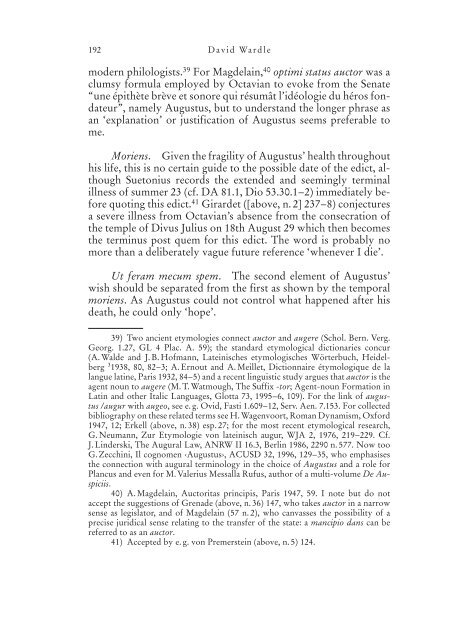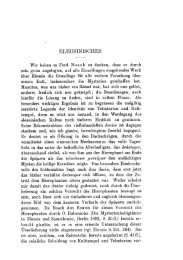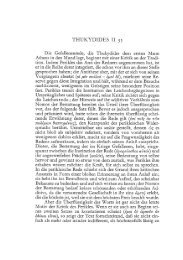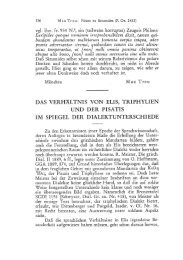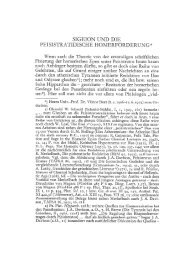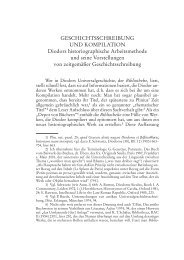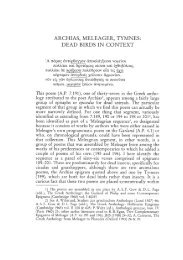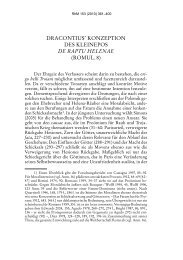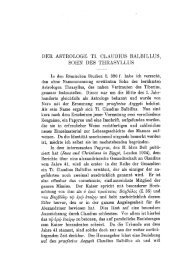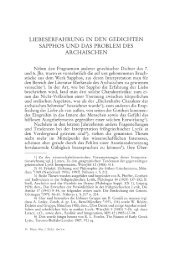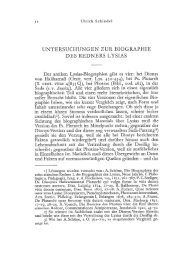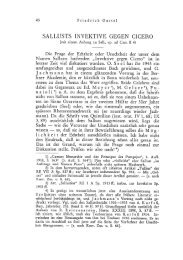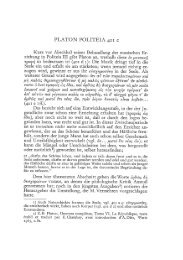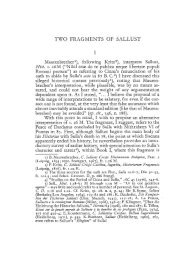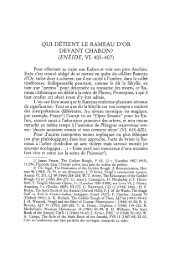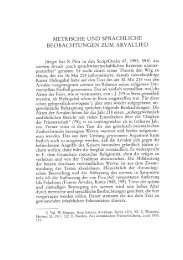VIRGILIO E STESICORO Una ricerca sulla Tabula Iliaca Capitolina *
VIRGILIO E STESICORO Una ricerca sulla Tabula Iliaca Capitolina *
VIRGILIO E STESICORO Una ricerca sulla Tabula Iliaca Capitolina *
Erfolgreiche ePaper selbst erstellen
Machen Sie aus Ihren PDF Publikationen ein blätterbares Flipbook mit unserer einzigartigen Google optimierten e-Paper Software.
192 David Wardle<br />
modern philologists. 39 For Magdelain, 40 optimi status auctor was a<br />
clumsy formula employed by Octavian to evoke from the Senate<br />
“une épithète brève et sonore qui résumât l’idéologie du héros fondateur”,<br />
namely Augustus, but to understand the longer phrase as<br />
an ‘explanation’ or justification of Augustus seems preferable to<br />
me.<br />
Moriens. Given the fragility of Augustus’ health throughout<br />
his life, this is no certain guide to the possible date of the edict, although<br />
Suetonius records the extended and seemingly terminal<br />
illness of summer 23 (cf. DA 81.1, Dio 53.30.1–2) immediately before<br />
quoting this edict. 41 Girardet ([above, n. 2] 237–8) conjectures<br />
a severe illness from Octavian’s absence from the consecration of<br />
the temple of Divus Julius on 18th August 29 which then becomes<br />
the terminus post quem for this edict. The word is probably no<br />
more than a deliberately vague future reference ‘whenever I die’.<br />
Ut feram mecum spem. The second element of Augustus’<br />
wish should be separated from the first as shown by the temporal<br />
moriens. As Augustus could not control what happened after his<br />
death, he could only ‘hope’.<br />
39) Two ancient etymologies connect auctor and augere (Schol. Bern. Verg.<br />
Georg. 1.27, GL 4 Plac. A. 59); the standard etymological dictionaries concur<br />
(A. Walde and J. B. Hofmann, Lateinisches etymologisches Wörterbuch, Heidelberg<br />
3 1938, 80, 82–3; A. Ernout and A. Meillet, Dictionnaire étymologique de la<br />
langue latine, Paris 1932, 84–5) and a recent linguistic study argues that auctor is the<br />
agent noun to augere (M. T. Watmough, The Suffix -tor; Agent-noun Formation in<br />
Latin and other Italic Languages, Glotta 73, 1995–6, 109). For the link of augustus<br />
/augur with augeo, see e. g. Ovid, Fasti 1.609–12, Serv. Aen. 7.153. For collected<br />
bibliography on these related terms see H. Wagenvoort, Roman Dynamism, Oxford<br />
1947, 12; Erkell (above, n. 38) esp. 27; for the most recent etymological research,<br />
G. Neumann, Zur Etymologie von lateinisch augur, WJA 2, 1976, 219–229. Cf.<br />
J. Linderski, The Augural Law, ANRW II 16.3, Berlin 1986, 2290 n. 577. Now too<br />
G. Zecchini, Il cognomen ‹Augustus›, ACUSD 32, 1996, 129–35, who emphasises<br />
the connection with augural terminology in the choice of Augustus and a role for<br />
Plancus and even for M. Valerius Messalla Rufus, author of a multi-volume De Auspiciis.<br />
40) A. Magdelain, Auctoritas principis, Paris 1947, 59. I note but do not<br />
accept the suggestions of Grenade (above, n. 36) 147, who takes auctor in a narrow<br />
sense as legislator, and of Magdelain (57 n. 2), who canvasses the possibility of a<br />
precise juridical sense relating to the transfer of the state: a mancipio dans can be<br />
referred to as an auctor.<br />
41) Accepted by e. g. von Premerstein (above, n. 5) 124.


